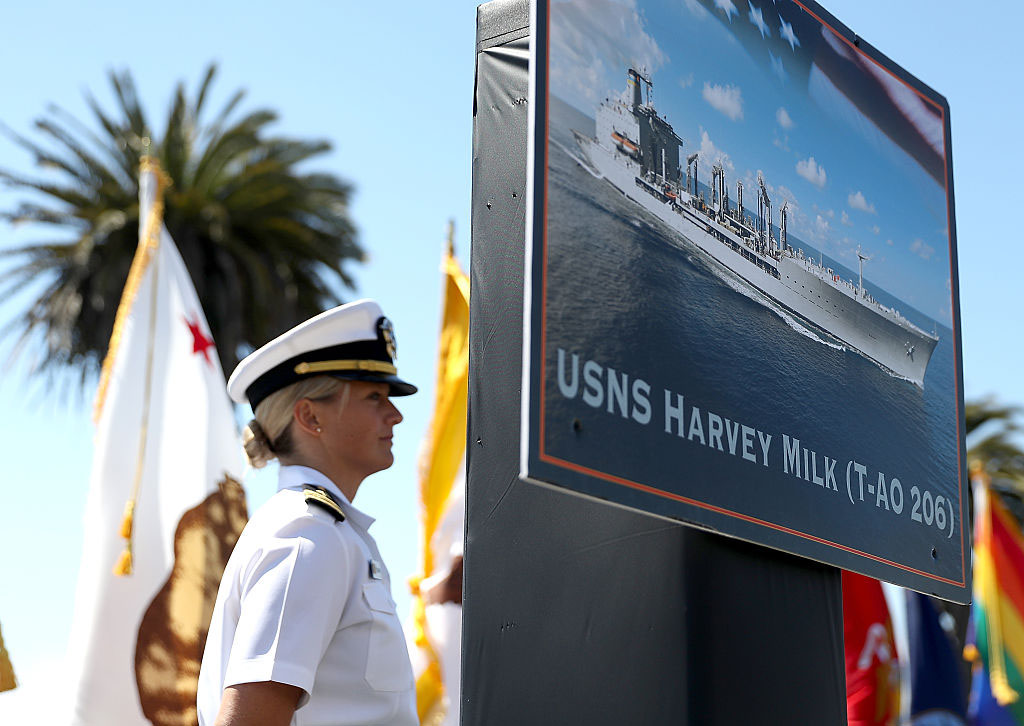Last month Defense Secretary Pete Hegseth announced that the USS Harvey Milk, the Navy supply ship named after former San Francisco Supervisor Harvey Milk, would be re-named. The Secretary’s reasons were to “take the politics out of ship naming” and to “restore warrior culture.” Ironically, a review of naval traditions reveals that Hegseth’s action raises politics in ship naming to an unprecedented level.
Ship naming has importance both because navy vessels are substantial government assets and for the historic tradition. The names often reflect values deemed worth risking the lives of those aboard. These considerations are guided by an 1819 act of Congress vesting the Secretary of the Navy with the responsibility subject to presidential authority.
Navy secretaries generally follow centuries-old conventions that are often subject to exception. So, the Navy’s 11 aircraft carriers are named for presidents. Except for the three that aren’t. The 14 nuclear ballistic missiles submarines bear the names of the states except for the one named for the late Senator Henry Jackson (D-Wash.).
For one of the carrier exceptions, President Richard Nixon decided in 1973 to name one after Congressman Carl Vinson (D-Ga.). Though Vinson never served in the military, he was deemed worthy for his advocacy of the navy during a long congressional career. The choice also broke tradition by honoring a living American, a practice generally dormant since the mid-19th Century. President Reagan made a similar politically tinged choice by honoring retiring conservative Senator John Stennis (D-Miss.) with another carrier naming.
Who should be considered when major government assets are named? The issue recalls the recent controversy over the naming of military bases and monuments after heroes of the Confederacy. President Trump once claimed that removing Confederate monuments damaged historical tradition and that a “slippery slope” of revisionism could threaten memorials to slave holders like George Washington and Thomas Jefferson. Trump failed to appreciate the difference between honoring slaveholding founders and Confederates. We honor Washington and Jefferson in spite of slaveholding, not because of it. In contrast, Confederate monuments commemorate efforts to destroy the Union and preserve slavery. Germans could teach Trump about the moral conflict in honoring valor in the pursuit of evil. There are no public memorials In Germany honoring World War II military “heroes.”
So, what is it about Harvey Milk that offends an administration that would honor Confederates? How could honoring him be portrayed as antithetical to a tradition so idiosyncratic and politicized? Born to a Jewish family on Long Island, Milk joined the Naval reserve as an officer candidate in 1951. He subsequently served on active duty on a rescue submarine in the Korean war. In 1954 Milk’s homosexuality came to the attention of the Navy. In accord with practice at the time he agreed to a discharge that was “other than honorable.” As a gay civilian Milk confronted discrimination like other LGBTQ Americans of his time. He became an out-of-the-closet activist, and the first openly gay politician elected to office in the United States. Tragically, he was gunned down at age 48 by a fellow supervisor, along with San Francisco Mayor George Moscone.
The naming of the USS Harvey Milk recognized those like Milk who contributed to the nation’s defense despite the discrimination they faced. It also memorialized the bravery of his pioneering and tragic life journey. Navy Secretary Carlos Del Toro commented at the ship’s christening that leaders like Milk “taught us that diversity of backgrounds and experiences help contribute to the strength and resolve of our nation.” Still true.
Only three ships in American history have been renamed for political reasons: the Milk and two ships whose names honored the Confederate cause. The latter ships were re-named in compliance with the provisions of the 2021 Defense Authorization Act. Hegseth was the first Secretary ever to rename a U.S. ship on his own authority for political reasons.
Hegseth’s action virtually reenacts Milk’s expulsion from the Navy and can only be seen as an attempt to resurrect the message that gay Americans are not welcome in the Navy nor in our national life. This message cannot and will not stand. Eventually, the injustice will be reversed by the naming of yet another ship after Milk. I’d vote for the next USS Harvey Milk to be a cruiser.
Dr. Daniel Stone is Regional Medical Director of Cedars-Sinai Valley Network and a practicing internist and geriatrician with Cedars Sinai Medical Group. The views expressed in this column do not necessarily reflect those of Cedars-Sinai.




